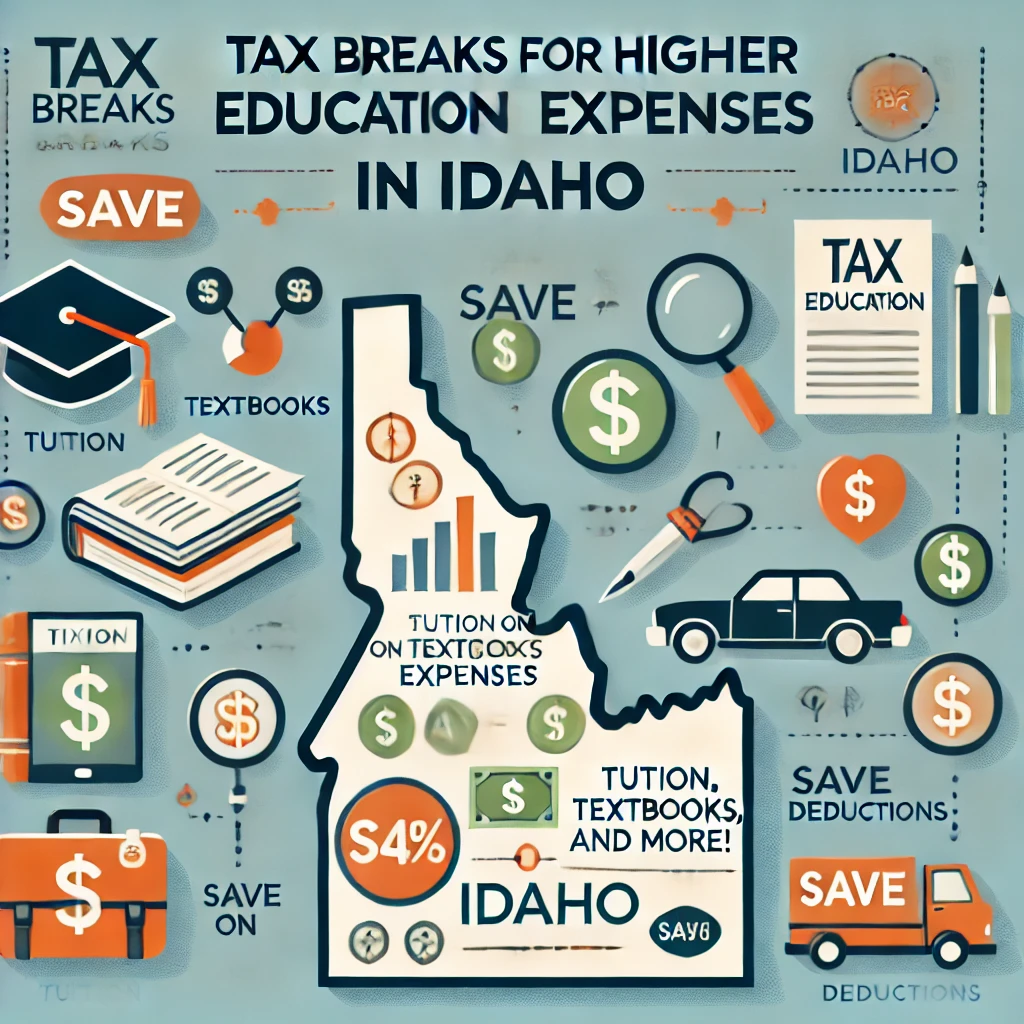Tax Breaks for Higher Education Expenses in Idaho
Higher education can be a significant financial burden for many families, but fortunately, there are several tax breaks available both at the state and federal levels that can help alleviate some of these costs. In Idaho, residents can benefit from a variety of tax incentives designed to make higher education more affordable. This guide provides an in-depth look at these tax breaks, how they work, and how you can take full advantage of them.
State-Level Tax Benefits
1. Idaho College Savings Program (IDeal)
The Idaho College Savings Program, known as IDeal, is a 529 college savings plan that provides significant tax advantages. Here are the key features:
Tax Deductibility
Contributions to an IDeal account are deductible on your Idaho state income tax return. This deduction is substantial, with a maximum annual deduction of $6,000 for individuals and $12,000 for married couples filing jointly. This means you can reduce your taxable income by the amount you contribute to the plan, up to these limits.
Tax-Deferred Growth
The money you invest in an IDeal account grows tax-deferred. You won’t pay taxes on the investment gains each year, which allows the account to grow more quickly than it would in a taxable account.
Tax-Free Withdrawals
When you withdraw the money to pay for qualified higher education expenses, such as tuition, fees, books, and room and board, the withdrawals are tax-free.
Gift Tax Benefits
Contributions to a 529 plan are considered gifts for tax purposes, so they can reduce your taxable estate. You can contribute up to $15,000 per year per beneficiary without incurring gift taxes. Additionally, there is a special provision that allows you to make a one-time contribution of up to $75,000 ($150,000 for married couples) per beneficiary and spread it over five years for gift tax purposes.
Federal-Level Tax Benefits
At the federal level, there are several tax credits and deductions available to help with higher education costs. These can be used in conjunction with state-level benefits to maximize savings.
1. American Opportunity Tax Credit (AOTC)
The AOTC is one of the most valuable education tax credits available:
Value
The credit is worth up to $2,500 per eligible student. It covers 100% of the first $2,000 of qualified education expenses and 25% of the next $2,000. This means if you spend at least $4,000 on qualified expenses, you will receive the maximum credit.
Eligibility
The AOTC is available for the first four years of post-secondary education. Students must be pursuing a degree or other recognized education credential and must be enrolled at least half-time for at least one academic period during the tax year.
Refundable
Up to 40% of the credit (up to $1,000) is refundable. This means you can receive this portion of the credit as a refund even if you owe no federal income tax.
2. Lifetime Learning Credit (LLC)
The LLC is another important federal tax credit for education expenses:
Value
The LLC is worth up to $2,000 per tax return, covering 20% of the first $10,000 of qualified education expenses. Unlike the AOTC, which is per student, the LLC is per tax return, so the maximum credit does not increase with multiple students in a household.
Eligibility
The LLC is available for all years of post-secondary education, including graduate and professional degree courses. It can also be used for courses to acquire or improve job skills. There is no limit on the number of years you can claim the LLC.
Non-Refundable
The LLC is non-refundable, meaning it can reduce your tax liability to zero, but you won’t receive any portion of the credit as a refund.
3. Tuition and Fees Deduction
Although not as beneficial as the AOTC or LLC, the tuition and fees deduction can still provide significant savings:
Value
You can deduct up to $4,000 of qualified education expenses from your taxable income.
Eligibility
This deduction is available for both undergraduate and graduate students. You do not need to itemize your deductions to claim it; it is an above-the-line deduction, meaning it can be claimed in addition to the standard deduction.
4. Student Loan Interest Deduction
If you have taken out student loans to pay for higher education, you can benefit from the student loan interest deduction:
Value
You can deduct up to $2,500 of interest paid on student loans from your taxable income.
Eligibility
The deduction is available for both federal and private student loans. You do not need to itemize your deductions to claim it.
Combining State and Federal Benefits
One of the best strategies for maximizing education tax benefits is to combine state and federal programs. Here’s how you can do it:
1.Contribute to an IDeal Account
Start by contributing to an Idaho 529 plan. The tax deduction for these contributions can reduce your Idaho state taxable income.
2. Claim Federal Tax Credits
Use the funds from your 529 plan to pay for qualified education expenses, and claim the AOTC or LLC on your federal tax return. This way, you benefit from both state tax deductions and federal tax credits.
3.deduct Tuition and Fees
If your education expenses exceed the amount covered by the 529 plan and federal tax credits, you can still claim the tuition and fees deduction or the student loan interest deduction.
Other Considerations
While the tax benefits mentioned above are substantial, there are other factors to consider when planning for higher education expenses:
Scholarships and Grants
These forms of financial aid are generally not considered taxable income as long as they are used for qualified education expenses. However, any portion used for non-qualified expenses, such as room and board, may be taxable.
Work-Study Programs
Earnings from work-study programs are taxable, but they can help reduce the need for student loans and provide valuable work experience.
Coordination of Benefits
Be aware that you cannot double-dip on tax benefits. For example, you cannot use the same expenses to justify both a tax-free distribution from a 529 plan and a tax credit.
Record Keeping and Compliance
Maintaining detailed records of all your educational expenses and tax benefits is crucial:
Receipts and Documentation
Keep receipts, billing statements, and documentation of any scholarships or grants received. This will be essential if you are audited or need to substantiate your claims.
IRS Forms
Be familiar with IRS forms related to education benefits, such as Form 1098-T (Tuition Statement) and Form 8863 (Education Credits).
Consult a Tax Professional
Given the complexity of tax laws and the potential for significant savings, consulting with a tax professional can ensure you are maximizing your benefits and complying with all requirements.
Conclusion
Navigating the various tax breaks available for higher education expenses can be complex, but the potential savings make it well worth the effort. By understanding and leveraging both state and federal tax benefits, Idaho residents can significantly reduce the financial burden of higher education. Whether through contributions to the Idaho College Savings Program, claiming federal tax credits, or taking advantage of deductions for tuition and student loan interest, there are numerous strategies to help make higher education more affordable.
For personalized advice and to ensure you are maximizing your tax benefits, consulting with a tax advisor or the Idaho State Tax Commission can be extremely beneficial. By planning ahead and staying informed, you can make the most of the available tax breaks and support your or your family’s educational goals.



